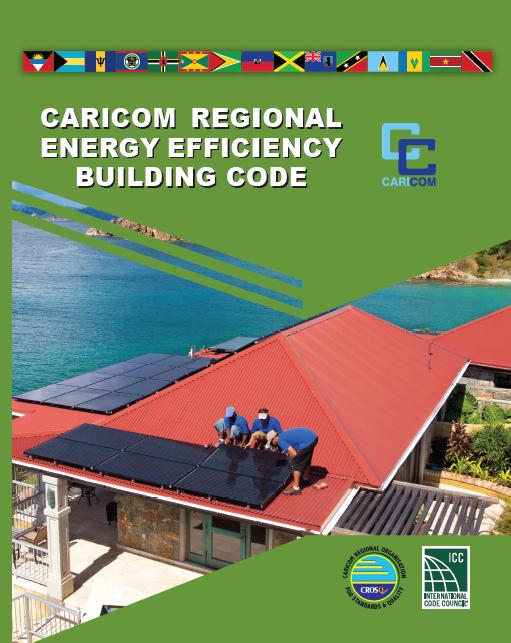Standards developed in collaboration with the International Code Council and ASHRAE
CROSQ releases new energy efficiency standards developed in collaboration with the International Code Council and ASHRAE
The new codes will help Member States improve the energy efficiency of their buildings and support energy conservation efforts
March 21, 2019, Washington, D.C. : The International Code Council, ASHRAE, the CARICOM Secretariat Energy Unit and the CARICOM Regional Organisation for Standards and Quality (CROSQ) announced today the release of new standards for energy efficient buildings for its Member States. The 2018 CARICOM Regional Energy Efficiency Building Code (CREEBC), which will cover both commercial and residential construction, is a joint effort by the CROSQ, the Code Council and ASHRAE.
“These standards for energy efficient buildings reflect the unique energy requirements of tropical environments and will ultimately increase adoption rates of more effectual technologies for renewable energy and energy conservation,” commented the CEO of CROSQ, Mr. Deryck Omar. “The adoption of these codes will go a long way toward allowing our members to mitigate the impacts of a changing climate. It also demonstrates the importance of bringing quality measures into the region’s energy sector and the potential benefits that can accrue when that happens.”
The CREEBC, which was developed through a collaboration between the CROSQ and the Energy Unit of the CARICOM Secretariat, is meant to meet the specific needs of nations in the Caribbean and other countries with tropical climates. It establishes minimum energy efficiency requirements for buildings, including the building envelope, cooling system, ventilation, pumping, lighting and the service water-heating systems.

Head of the Energy Unit at the CARICOM Secretariat, Dr. Devon Gardner, said, “The CREEBC is envisioned to lead to an era of better quality building designs within the Caribbean Community, noting that the ability of buildings to minimize the energy requirements for the services for which they were intended would reduce the exposure to climate and disaster risks.” He stated, as an example, that “Energy‑efficient measures and systems, such as daytime lighting and improvements in ventilation, can facilitate the comfort of occupants in buildings even during periods of natural disaster‑related stress on the electricity grids.”
“We were pleased to have the opportunity to collaborate with our colleagues at the CROSQ to help adapt the Code Council’s latest energy standards to help their members improve the efficiency and sustainability of their buildings,” said Code Council CEO Dominic Sims, CBO. “Our codes are not one-size-fits-all. They are a starting point for developing standards that meet the individual needs of regions around the world.”
“Improving energy efficiency is a global challenge, with buildings professionals serving as a crucial contributor toward the establishment of standards that affect building systems operations,” said 2018-2019 ASHRAE President Sheila J. Hayter, P.E. “The CREEBC and ASHRAE’s collaboration with partnering organizations represent our long standing dedication to global sustainability and leadership in use of integrated building design resources.”
The development of the CREEBC is part of the ongoing implementation of the Caribbean Sustainable Energy Roadmap and Strategy (C-SERM), a CARICOM program aimed at increasing political will and private sector input for the adoption of more effective technologies for renewable energy, energy conservation and efficiency.
To view the CREEBC online, click here.
###
About the International Code Council
The International Code Council is a member-focused association dedicated to developing model codes and standards used in the design, build and compliance process to construct safe, sustainable, affordable and resilient structures. Most U.S. communities and many global markets choose the International Codes.
About CARICOM Regional Organisation for Standards for Quality
The CARICOM Regional Organisation for Standards and Quality is an inter-governmental organisation with its primary objective being the establishment and harmonisation of standards and the development of the region’s Quality Infrastructure for the enhanced efficiency and improved quality in the production of goods and services in the Caribbean Community.
About the CARICOM Secretariat
The Caribbean Community (CARICOM) Secretariat is the principal administrative organ for the Caribbean Community. The Secretariat is intended, inter alia, to contribute, by supporting Member States, to the improvement of the quality of life of the People of the Community and the development of an innovative and productive society, through partnerships with institutions and groups.
ASHRAE
ASHRAE is a global society advancing human well-being through sustainable technology for the built environment. ASHRAE and its more than 50,000 members worldwide focus on building systems, energy efficiency, indoor air quality, refrigeration and sustainability. Through research, standards writing, publishing, certification and continuing education, ASHRAE shapes tomorrow’s built environment today.
